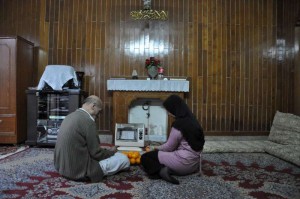Afghan father and daughter reunite with family after 20 years
Thursday, June 13th, 2013 12:15:04 by Tahir Khan
More than two decades after fleeing Afghanistan with her devoted father, Deeba* has been flown out of Pakistan to rejoin her brothers and sisters and receive specialist care for her disability.
The 38-year-old, who suffers from an intellectual disability, arrived in New York earlier this year to a warm welcome from her siblings, who never gave up on finding a way to be reunited in the United States. It was the first time she and her father Abdul* had met their relatives in two decades and came after a long verification process by US authorities of Deeba’s application for resettlement.
Despite the wait, Deeba counts herself lucky. Thousands more don’t get accepted. Deeba and Abdul’s story highlights the importance of family for refugees as well as the need for greater knowledge about the processes and criteria for resettlement and family reunification.
Absent from the joyous reunion, were Deeba’s mother and a son, who went missing in the Afghan capital of Kabul in 1991. Abdul, aged 70, had told UNHCR staff in Islamabad – on the eve of their departure for New York – about their tragic loss and ensuing flight into exile.
“I can never forget that fateful day,” the old man said, adding that they were caught in a rocket attack on the city. “My wife was injured when a stray round hit our house. My son rushed her to the hospital while the rest of us moved to a friend’s house,” Abdul explained. “I never heard back from them . . . That was the last time I saw them.”
With the city under siege and increasingly dangerous, Abdul closed down his import-export business a few days later and sought shelter in neighbouring Pakistan with his surviving two sons and six daughters, including Deeba.
Over the years, Abdul’s children emigrated to the United States one by one and they eventually managed to secure a visa for Abdul. However, due to poor legal advice, Deeba’s siblings were not successful in obtaining a visa for her – she was at risk of being left behind in Pakistan, without any family support.
After receiving his visa, Abdul decided that he could not leave his daughter alone. “She suffers from intermittent fits, during which she could harm herself. I have to stay with her at all times,” he said. “We have been each other’s companion during all these desolate years,” he noted, as a smiling Deeba nodded by his side.
Their bond is clearly strong and they share most things, including the household chores. “I do the dishes and clean the house,” said Deeba, as her father owned up to being the cook.
Their family in the US never gave up hope of a reunion. “Deeba’s resettlement only became possible [largely] because of her family’s proactive pursuance of her case,” noted Amy Buchanan, UNHCR’s associate resettlement officer in Islamabad.
At first they tried to go through the immigration route, applying several years ago for Abdul to join them. However, they were advised by their lawyer not to file a separate application for Deeba, whom it was mistakenly thought could be added to his visa as a dependent at a later stage. Inevitably, this led to problems when Abdul told US officials about Deeba during his visa interview in 2011.
He was told that because she was an adult, a separate application had to be filed for her and that processing could take up to a decade. Abdul decided he could not go without her. It was only when Deeba’s sister-in-law brought the case to the attention of UNHCR that things started moving.
UNHCR investigated every available option to reunite Deeba with her family. Her father’s age was also a consideration, because, as Buchanan explained, “In Pakistan, her elderly father was her only carer, but he could not be of long-term support because of his age.” It took a year, which is normal under the US Department of Household Security’s strict resettlement process, but she was accepted for resettlement.
The UN refugee agency recognizes that refugees living with disability have specific needs and that the support of friends and family often remains the only care mechanism they can rely on. In cases where such support is not available in Pakistan, but a refugee has relatives abroad who are willing and able to care for them, UNHCR may be able to facilitate their resettlement.
However, many refugees are not aware of such options. “In many cases, families . . . never find their way through the proper channels and some of the most needy people are left in limbo,” Buchanan explained. UNHCR in Pakistan works with other organizations to find solutions for people living with disability, including setting up resettlement referral mechanisms.
Tags: Afghanistan, UNHCRShort URL: https://www.newspakistan.pk/?p=40583

















